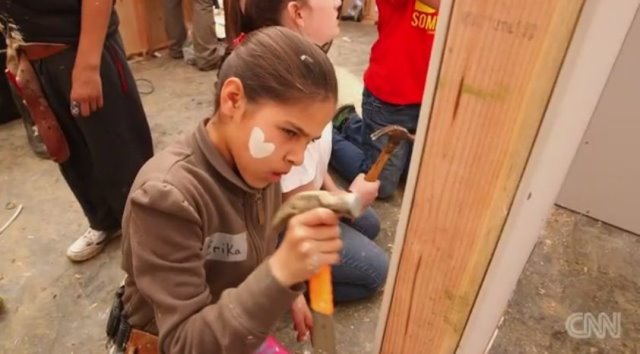Many families in Mexico migrate to the country’s Baja region on the West Coast seeking jobs and a better lives. Though they find employment, they often join the ranks of Mexico’s “working poor,” barely earning the equivalent of $100 a week.
Their homes are piecemeal, built out of scrap parts — some missing a roof and lacking electricity. These families want better homes, but simply can’t afford them. One nonprofit organization is trying to to help .
Homes of Hope International builds houses for families in need — like the Noyes Cervantes family from Tijuana.
The family of six lives in a plywood and cinder block structure, measuring 6 feet by 10 feet, with a tarp for a roof and a dirt floor. Luis and Susana share a mattress on the ground with their four children. The family squeezes into the room, which barely holds the mattress, a rickety bookshelf to hold clothes, and a propane burner to cook food. There is no door or windows or even electricity. The only plumbing they have is their makeshift bathroom — a toilet, a hose for a shower, and a utility sink.
“We’re very cramped. We’re not satisfied,” said Luis. “It was difficult to sleep at night, all of us on the same mattress; and we would complain every day.”
Luis works 12-hour graveyard shifts at a factory — earning about $75 a week. He saved up enough from his factory job to buy a small piece of land, but he doesn’t have money to build a home. That’s where Homes of Hope International comes in.
The group’s founder believes home ownership can help end a family’s poverty. “When people get a house, they actually think differently about their future,” says Homes of Hope’s Sean Lambert. “In one generation, you can break the cycle of poverty over a family’s life.”‘
Lambert says providing a safe, clean home can end poverty because families no longer have to save up to build a house. They can put that money towards their children’s education, eat healthier food, and by no longer living a dirt floor — lower the risk of illnesses.
Since its first home in 1990, the organization has built more than 4,000 houses in the northern Baja region of Mexico. It’s also expanded to other parts of the world such as Africa and Asia. The homes are built by volunteers who sign up to work a weekend alongside Homes of Hope staff. Each house is completed in two days — rain or shine.
Jason Solomon volunteered with his family and friends. Solomon was astounded by the Noyes Cervantes’ living conditions and also by their graciousness. “It was shocking and humbling…and overwhelming,” said Solomon who hails from Southern California and works in finance. “They seem to be happy with what they have.”
To receive a home, a family must own their own land, be employed, and have children. The homes are either 16 by 16 feet or 16 by 20 with three rooms, electricity, windows and doors. They come furnished with new furniture and kitchenware.
“To just see the joy in their faces and the excitement,” said Solomon, whose his teenage son convinced him to volunteer after building a house last year. “I’m going to see that image probably for the rest of my life.”
The Noyes Cervantes family not only received a new home but an unexpected outpouring of support from the volunteers.
“I was shocked because there is a lot of love coming from people that do not know you, yet they give you a lot of love and so much security,” said Susana. “There is a lot of love in people, too much love.”



